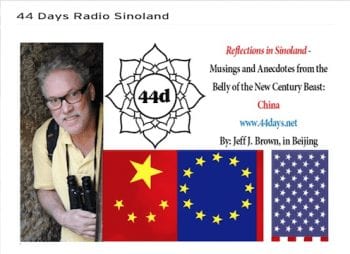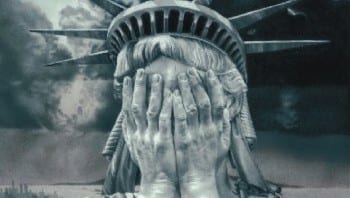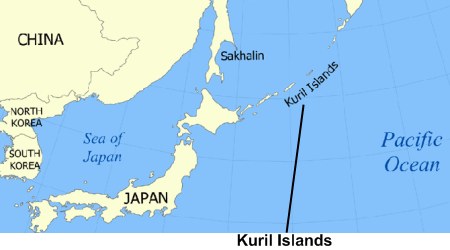Obama Requests Support for Possible War Against Russia
According to Deutsche Wirtschafts Nachrichten (German Economic News), on April 23rd, U.S. President Barack Obama is “demanding the active deployment of the Bundeswehr [Germany’s armed forces, including their Army, Navy, and Air Force] to NATO’s eastern borders” at Poland and the Baltic republics, to join the quadrupling of America’s forces there, on and near those borders of Russia. (This is an extreme violation of what Russian leader Mikhail Gorbachev agreed to when he ended the Soviet Union and its NATO-mirror organization the Warsaw Pact, but it’s actually culminating a process that began shortly after he agreed to America’s terms, which included that NATO “not move one inch to the east.”)
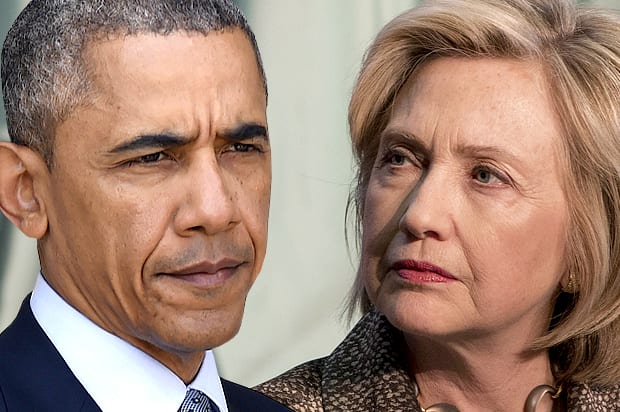
Obama and Hillary—two shills for the plutocracy that guarantee the potential destruction of humanity and the planet in our time via a cataclysmic and unnecessary war—the ultimate crime. None of the crazy plans that this duo endorses are being communicated to the public by the Western media.
Furthermore, DWN reports that on April 25th, the U.S. President will hold a “summit meeting” in Hannover Germany with the leaders of Germany (Angela Merkel), Italy (Matteo Renzi), France (Francois Hollande), and Britain (David Cameron). The presumed objective of this meeting is to establish in NATO’s countries bordering on Russia, a military force of all five countries that are headed by these leaders, a force threatening Russia with an invasion, if NATO subsequently decides that the ‘threat from Russia’ be ‘responded to’ militarily.
NATO’s surrounding Russia with hostile forces is supposedly defensive against Russia — not an offensive operation. During the 1962 Cuban Missile Crisis, America’s President JFK didn’t consider Nikita Khrushchev’s plan to base nuclear missiles in Cuba to be ‘defensive’ on the USSR’s part — and neither does Russia’s President Vladimir Putin consider America’s far bigger operation, of surrounding Russia with such weapons, to be ‘defensive’ and not offensive. The U.S. Government, and NATO, act as if Russia is surrounding them, instead of them surrounding Russia — and their ‘news’ media transmit this lie as if it should be taken seriously, not as its being a lie; but, in actual fact, NATO has already expanded right up to Russia’s western borders.

Germany’s Angela Merkel has shown herself to be as abject a tool of the American empire as any EU politician in recent memory, perhaps worse. In Europe, she plays Japan’s Abe’s evil twin.
Obama is thus now adding to the economic sanctions against Russia that he had imposed allegedly because of Russia’s alleged ‘seizure’ of Crimea from Ukraine after Obama’s coup overthrew Russia’s ally Viktor Yanukovych who led Ukraine until the coup in February 2014.
Right after Crimeans voted overwhelmingly to rejoin Russia, Obama slapped sanctions against Russia (even though Western-sponsored polls in Crimea, both before and after the coup, had shown higher than 90% support by Crimeans for rejoining with Russia), and nuclear weapons were prepared, both on the U.S.-EU side and on the Russian side, for a possible nuclear war.
This is no mere restoration of the Cold War (which was based upon the capitalist-communist ideological disagreement); it’s instead getting forces into position for a possible invasion of Russia, pure-and-simple — raw conquest — though no major news-media in the West are reporting it as being such.
That preparation doesn’t necessarily mean a nuclear war will result. Russia might accept whatever the demands of ‘the West’ are, and thus lose its national sovereignty. Otherwise, ‘the West’ (the U.S.leadership, and the leaderships in its allied countries) might quit their evermore-ominous threats, and simply withdraw from Russia’s borders, if Russia stands-its-ground and refuses to yield up its national sovereignty.
Basically, the U.S. leadership decided to take over Ukraine, and refused to acknowledge the rights of the Crimean people to reject being conquered by the U.S. — and Russia’s leadership decided to protect them against the type of invasion that subsequently occurred in Ukraine’s former Donbass region, where the opposition to Obama’s coup was even more intense.
[dropcap]S[/dropcap]upposedly, ‘the West’ is asserting that Russia is somehow in the wrong here; but, since even the head of Stratfor has called what Obama did in Ukraine “the most blatant coup in history”, and since the fact that it was a U.S. coup has been documented extensively on cellphone and other videos, and in the most thorough academic investigation that has been performed of the matter — and was even acknowledged by Ukraine’s Petro Poroshenko, a participant in the coup, to have been a coup — and since evidence survives on the Internet of the U.S. Embassy’s preparations as early as 1 March 2013 for the February 2014 coup; and since even the U.S. government’s hired polls showed that Crimeans rejected overwhelmingly the U.S. coup and supported rejoining Russia; the question still needs to be answered: What basis of ‘the West’s’ aggressive actions threatening Russia’s national security is there, other than such lies by the West, against Russia’s President? And, that’s a very worrisome basis — worrisome regarding, essentially, dictatorship in ‘the West’, rather than regarding any dictatorship outside ‘the West’. The dictatorship here seems clearly to be coming from the West, against the East.
Back in January, Russian President Vladimir Putin called-out American President Barack Obama on Obama’s big lie, that America’s “ABM” weapons to disable in-flight nuclear missiles were being installed in Europe in order to protect Europe against Iranian nuclear missiles, but now the U.S. acknowledges that Iran doesn’t have, and won’t have, any nuclear missiles, and yet Obama is stepping up (instead of ending) those ABM installations — even though the alleged anti-Iranian reason for them is gone. The only actual reason they have been installed, Putin argues, is in order to enable a blitz nuclear attack against Russia, which will include disabling Russia’s retaliatory capacity.
SIDEBAR
Just look at this disgusting piece of news. Apparently poor Germany is awash in mainstream liberals.
SIDEBAR ENDS HERE
Any in-depth news-report about Obama’s organizing for a possible invasion of Russia, needs to deal, therefore, with the key question: What basis of ‘the West’s’ aggressive actions threatening Russia’s national security is there, other than such lies by ‘the West’? And, if there is no honest answer to it, then the only rational response by Western publics, to what Obama and his foreign allies are doing, is to recognize what is actually happening and to take action against their own leaders, before this increasingly high-stakes confrontation — of no benefit but only extremely high costs, to publics around the world — becomes terminal. In that instance, Western publics need to defend themselves against their own nation’s leaders. This is a situation that is frequently encountered in dictatorships.
The key questions are not being asked in the Western press; they are being ignored by it. Unless these questions are publicly dealt with — and soon — the answer, to them all, could well be terminal. Consequently, any ‘news’ medium that fails to address them is less than worthless; it is sheer propaganda that merely parades in the mask of being a ‘news medium’: the potentially terminal questions are then being ignored, and lies are promoted instead, which distract the public from the most urgent public-affairs issue of them all, in our era, not draw the public’s attention to that overriding international-affairs issue.
The closer that things are getting to a nuclear war, the more difficult becomes either side’s backing down from it — and this is especially the case with the aggressor (most especially when it falsely claims that it is being aggressed-against, and this is the reason why the lies urgently need to be exposed).
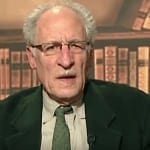 They're Not Even Close: The Democratic vs. Republican Economic Records, 1910-2010, and of CHRIST'S VENTRILOQUISTS: The Event that Created Christianity.
They're Not Even Close: The Democratic vs. Republican Economic Records, 1910-2010, and of CHRIST'S VENTRILOQUISTS: The Event that Created Christianity.
=SUBSCRIBE TODAY! NOTHING TO LOSE, EVERYTHING TO GAIN.=
free • safe • invaluable
[email-subscribers namefield=”YES” desc=”” group=”Public”]


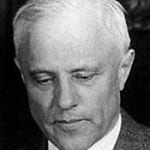
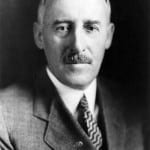
 Contributing Editor, Murray Polner wrote “
Contributing Editor, Murray Polner wrote “




